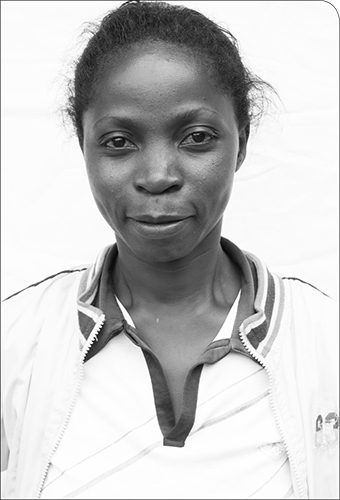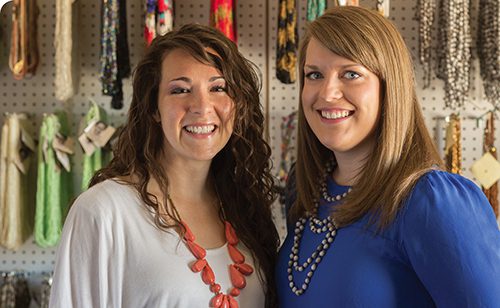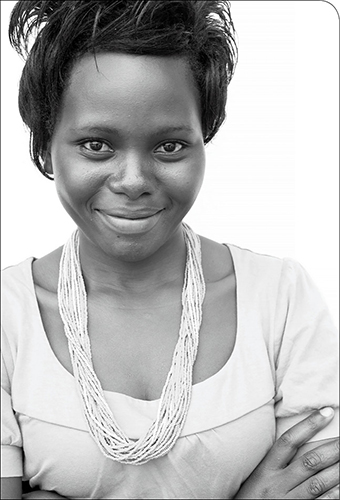By Charlene Renberg Winters (BA ’73, MA ’96)

A trio of BYU alumni founded a nonprofit that helps Ugandan women like Eve Namyalo develop skills needed to work as artisans and support their families.
Eve Namyalo was terribly shy. The Ugandan mother, who supported her children by washing clothes for BYU students visiting Africa on a service internship, would not look directly into the interns’ eyes.
“I worried about Eve,” says Rebecca J. Burgon (BS ’10). “She had poor health and lived in her pastor’s garage.”
And, adds Melissa C. Sevy (BS ’04, MPH ’09), “our concerns extended beyond Eve to other bright, capable women we met.” Burgon and Sevy were among 30 BYU students who traveled to Uganda in 2009 to assist villagers with a variety of health, literacy, business, and education programs on behalf of HELP International, a Provo-based nonprofit organization.
“As the end of summer approached, we wondered how [these women] would live when their seasonal employment disappeared,” Sevy says. “In the majority of the households in Lugazi, the women have the economic responsibility for their families, but [they have] few prospects. Scraping together a living . . . is challenging, and most cannot afford to send their children to school.”
Sevy and Burgon, along with Kristen Daniels Wade (BS ’08), decided to create a way to help the women become self-sufficient. Working with Ugandan women as part of her internship, Burgon found that many were interested in learning how to make jewelry. “We had seen native jewelry . . . in the tourist towns and loved it,” Burgon says. So when the trio formed their own nonprofit—named Musana, or sunlight, per the suggestion of Ugandan women in the group—they focused on helping women develop the skills needed to earn money as jewelry artisans, while also offering supplemental classes in literacy, English, finance, entrepreneurship, and health.
Their objective is to “graduate” Musana participants and open spots for other artisans-in-training. “When we and they think they are ready to support themselves, we give our ladies a certificate of completion and provide them with the funding and mentoring to start a business,” Burgon says. Those without the means or health to embark on their own are welcome to stay with Musana and work there, and they often serve as mentors for new trainees.

Melissa Sevy (left) and Rebecca Burgon, along with Kristen Wade (not pictured), founded a nonprofit that helps Ugandan women like Cissi Birungi (below) develop skills needed to work as artisans and support their families.
When Sevy, Burgon, and Wade began the process, Sevy says, “We were incredibly naïve, which was good in a way because otherwise we may not have had the courage to undertake Musana.” Their lack of business training left them unprepared for an armload of challenges. Their initial funding came from their own student-budget pockets, and they considered quitting when they discovered pilfering by their first manager. But after a company placed an order for 10,000 pieces of jewelry, Sevy, Burgon, and Wade decided to continue their efforts.
Since then, more than 100 volunteers—most of them BYU students and graduates—have offered services ranging from website and logo design to marketing, accounting, and public-relations help. And a college-educated Ugandan woman now serves as their Uganda manager, communicating with the group in Provo, where the inventory is shipped. Musana sells jewelry on its website, in a few area stores, and at in-home “Musana Markets.” All sales profits, donations, and grants are invested in future educational and vocational training for Ugandan women.

Cissi Birungi supports her family by creating jewelry for Musana, a nonprofit founded by a team of BYU alumni.
Sevy, who works part-time as a BYU and Utah Valley University adjunct faculty member in public health, spends much of her time in Uganda, which she considers her second home. “This is my passion,” she says. “This program changes lives, and the joy I see in these women is infectious. Many are learning to read and write in Luganda and English for the first time. Their children attend school, they can afford preventative and medical care, and they save for the future.”
And the Ugandan participants feel empowered. In 2012 Cissy Birungi joined the group, and as she described her life as an abandoned wife trying to feed her babies, she started to weep. Eve, now sassy and cheerful, told her, “Girl, you have no reason to cry anymore. You’re with us.”
“That was so motivating,” Burgon says. “To see Eve come full circle and to see the impact of Musana on the lives of these women makes us so happy.”
For more information on Musana, visit musanajewelry.org.






